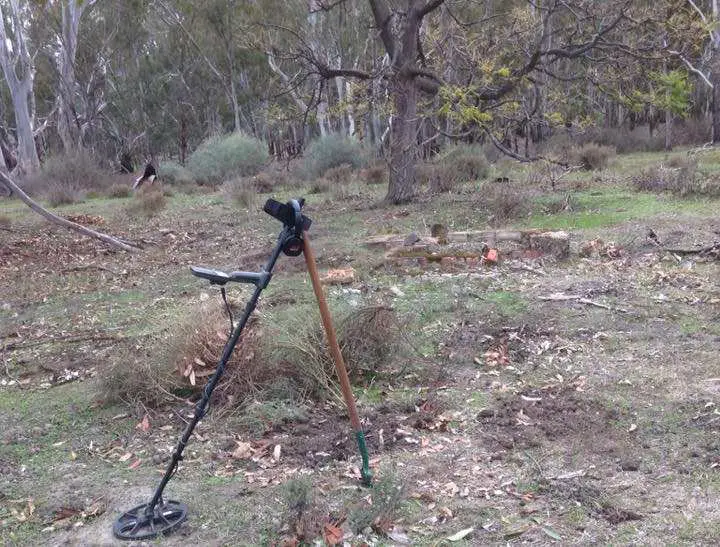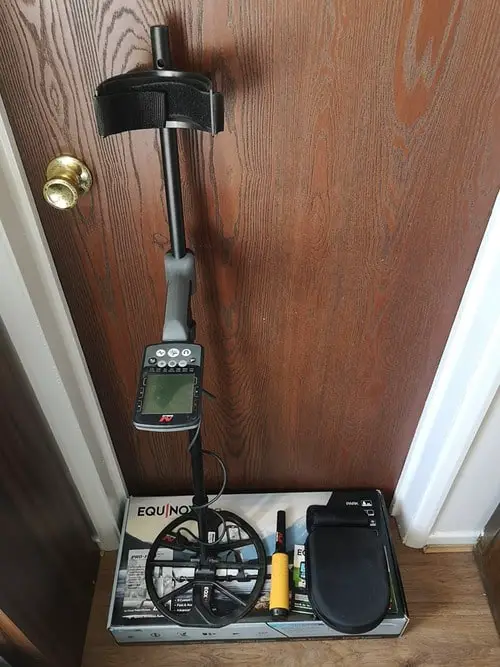
Missouri, known for its BBQs and Tornados, is also a hub for many detecting hobbyists who are looking for highly valuable finds!
Nevertheless, I would recommend you to pay attention to the regulating rules! In fact, this could lead you, if you violate them, to unnecessary problems with local authorities …
… In this Post, I talk about the following topics:
- The rules organizing metal detecting in Missouri
- Best places to explore there!
- Detector recommendations for the type of soil
- Searching for Gold there
- Some relevant clubs that you can join
So, let’s get into that ..
What are the metal detecting laws in Missouri?
The law of the state permits the detection of metals in the 12 state parks. The detection of metals can be carried on specific sand beaches of these state parks.
For the procedure, the team has to take a written permission from the Missouri Department of Natural Resources, Facility and Visitor Services Program, P.O. Box 176, Jefferson City, MO 65102.
The engaged team can also seek permission by writing a mail to moparks@dnr.mo.gov (might be different in the future). Don’t forget to mention your name and postal address while writing a letter to the regulating body.
The granted permission remains valid for one year. While performing the process of detection, if any metal is found which possess historic means or any archaeological value it has to be notified to the concerned department.
The first law which manages the activity is the ARPA (Archeological Resources Preservation Act). This law covers its hold on only state and federal lands. As per this law, you cannot detect anything which is 100 years old.
Another law which rules over here is the NHPA (National Historic Preservation Act). To carry out the exploring private firms, you have to take written permission from the landowner before starting the procedure.
Where to go detecting in Missouri?
The enthusiastic team for digging of treasure can perform the procedure of detection on Bureau of Land Management!
The activity is permitted on BLM lands except the places representing cultural and archaeological values. Moreover, the use of detectors for finding treasure is prohibited on the grounds of National Parks, Recreational Areas, or National Monuments.
Lands covered under detecting activities are developed campgrounds and picnic areas. The search of coins and other minute treasures are allowed on these areas, but if gold is found it has to be notified to the local FS office.
Overall the activity is legally permitted on the following 12 state parks as follow:
- Cuivre River State Park: Time: 7:00 am to 9:00 am. Known for its natural wildness. Gives a touch to the agricultural landscape of Northern Missouri
- Finger Lakes State Park: Time: 7:00 to 9:00 am. Developed in a coal mining area. Hilly trains, leafy trees on the spacious campground are its specialty
- Lake of the Ozarks State Park: Time: 7:00 to 9:0 AM. Vast campgrounds extended with wild trees makes it in the top list for the hunting of treasure
- Lake Wappapello State Park: Time: 7:00 to 9:00 am. A public recreational area is known for its camping, biking, hiking, hunting, and various other activities
- Long Branch State Park: Time: 7:00 am to 9:00 am. A sandy beach is known for its water sports and camping activities.
- Pomme de Terre State Park: Time: 10:00 am to Noon. The park features camping grounds in the Pittsburgh and Hermitage areas of the park
- Advice Stockton State Park: Time: 7:00 am to 9:00 am. Hawker point campground for the activities is the gift of the park
- Trail of Tears State Park: Time: 7:00 am to 9:00 am. View of the Mississippi river along with the hunt features the specialty of the park.
- Truman State Park: Time: 7:00 am to 9:00 am. The natural wildlife and the grasslands at Marina offer expanded ways of hunting activities.
- Mark Twain State Park: Time: 7:00 am to 9:00 am. The north-central situated park features Mark Twain lake for detection activities.
- Wakonda State Park: Time: 7:00 am to 9:00 am. Clearwater lakes of the park makes the use of detectors much easier.
- Watkins Mill State Park: Time: 8:00 am to 10:00 am. Kansas City area offers a broad options for treasure hunting in the park.
A Decent Detector for this state soil

A decent detector is the one which can fulfill the purpose of operating on all-terrain! There are several machines that can fulfill that in the market, but the 2 I am recommending here are the:
- Fisher F22 (Check it Here at Amazon!): Introduced as a type of ground detector. The product features the frequency of 5 & 9 kHz along with the capacity of 4 variable detecting tones. Use of headphones to detect the sound is another additional feature of the product. However, the detector lacks the capability of automatic ground balancing and noise cancellation … Which you won’t really need unless you are dealing with difficult ground conditions!
- Garrett AT Pro (Check it Here at Amazon!): It is a revised version of Garrett ACE 250. The device offers additional features of getting you to know whether to dig or not. Compared to ACE 250, which contains 12 groups of metals for graphic discrimination, this product features the two times larger graphic discrimination scale as metals in this are cut thinner.
Finally, if none of these machines matches your expectations in terms of performance, which I highly doubt, you may want to Check my Favorite Detector Here at Amazon! It is an advanced Minelab model that operates on 5 frequencies depending on your target!
Gold Prospecting in there
During the ages, when glaciers expanded from the north, a number of materials moved along them. The list also included gold along with the highly valuable rocks and minerals!
When the glaciers retreated, they left behind the debris which also contained the dusty layers of gold. Due to this reason the ice sheets are called natural gold miners since the ages…
… Hence, gold can be found anywhere the glaciers had been. Other than Missouri, the states which may have native gold deposits are New England States, New York, Pennsylvania, Ohio, Michigan, Indiana, Illinois, Wisconsin, Minnesota, Kansas, Nebraska, and the Dakotas!
However, the prospects of a decent amount of gold are more in the states where it is produced naturally than the gold which came with the movement of glaciers. Alaska or the Western US is said to be one of the largest natural gold producing regions.
The bursting pressure of ice sheets distributed the gold in the layers and in a very few areas concentration of gold found to be appreciable.
To know more about the ways to find gold in an efficient way, you really should check this Gold Searching and Detection Post! I’ve spent lot of time putting it together and I am sure you will find a significant value in it.
Detecting in Missouri Lakes and Rivers …
Detecting in the Missouri lakes and rivers is far more complicated than the state parks. However, it brings much more fun to the table!
There are a number of tips mentioned below for an enthusiastic person for detecting in lakes and rivers:
- Carry a bug spray: You may not be aware of the infectious mosquitoes and flies around you while you are in the water. Applying a bug spray on your clothes and exposed parts of the skin will prevent you from these disease-causing creatures. Along with this, it can protect from the ticks, which may founds while you were walking through the woods to reach the lake.
- Know the tides: Select the appropriate time for hunting in the river when the frequency of waves are not very high. Also, do not go very far away from the bank of the river for the hunt.
- Carry a cell phone: Hunting in a river carries a bit higher risk, so it is advisable to bring a phone in case any injuries or unfortunate instances take place. Be aware of the animals which can attack from the woods on you. There are various applications available nowadays which can help you in your hunt. Hence carrying a phone can prove beneficiary in these terms also.
Getting your Permit to Detect in Missouri
After getting a permit from the regulated body, there are specific rules which a person must have to follow while going on the hunt for treasure:
- The detection can be performed on the granted river banks and their adjacent waters.
- The machine cannot be more than 12″ in overall length and 3″ in width. The digging tools cannot be more than 12″ in total length and 6″ in width
- Do not cut any trees or dislodge their roots. No natural harm to the environment should occur while going on for using detecting tools in the field
- The person should have the permission granted form with him all the time while in the field for the hunt
- You cannot transfer your issued permit to another person. The permitted form is non-transferrable.
- Inform the FS if any item is having an archaeological or cultural value of more than $10.
- The regulated body has the authority to cancel the permit of anyone if found not complying with the stated rules
Are there Good Detection Clubs in Missouri?
The metal detecting clubs could be very helpful for newcomers as well as for those who are seasoned!
Such clubs can teach you from the basics of how to perform the detection activity in the areas and can make you aware of many new facts of which you are unaware of. The good detection clubs counted in Missouri are:
- Gateway metal detecting club: The significant areas of Missouri covered by this club are: St. Louis County, South St. Louis City, Jefferson County and Illinois areas of Monroe and Randolph Counties.
- Midwest coin shooters and historic club: Established in the 1980s and now working with 120 members for the passionate hunters
- Midwest coin & relic hunters: This club is made for all the generations who love to preserve the historical relics.
Conclusion
My main purpose behind putting together this Mini-Article is simply to push you towards exploring new places and territories! This will allow you to get off your comfort zone and to come up with your most valuable finds!
… Missouri is a worthy state that you should definitely try exploring as soon as you possibly can! I am sure that you will come up with pretty interesting targets!
For more states, you probably should have a look at detecting guide in Minnesota!
